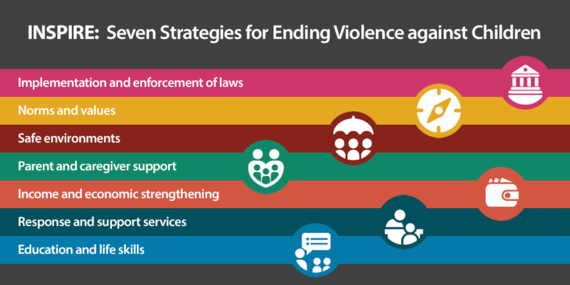As a society, we have unanimity about few things, but one of these is that no child should be harmed by violence. And yet, every five minutes a child somewhere in the world dies a violent death, and half of all children in the world -- a billion kids -- experience violence each year. Violence -- emotional, physical, and sexual -- is rampant in high-income countries, including the U.S., as well as in low- and middle-income countries, and across ethnic and racial groups.
Three seminal studies the Centers for Disease Control and Prevention (CDC) has done with partners have revealed both the shocking frequency of violence against children, and the devastating, pervasive, life-long health impacts of violence.
Aggregating survey data from 96 countries across the world CDC documented that each year more than 1 billion children around the world likely experience some form of violence. CDC has also been working with a global private public-partnership called Together for Girls, UNICEF, and governments in more than 15 countries, documenting that well over half of both girls and boys in these countries experience some form of violence each year and that typically about one out of three girls and nearly one out of six boys have been sexually abused as a child. These data have been used by participating countries to focus and guide actions to prevent this violence. And working with Kaiser Permanente in the US, CDC led the long-term Adverse Childhood Experience (ACE) Study. ACE found that children who experienced violence or other traumatic events were more likely to develop cancer, stroke, heart disease, diabetes, did worse in school and at work, and were more likely to attempt suicide. They're also more likely to become pregnant as teens, commit crimes, and abuse their partners and own children as adults. These findings have been replicated in countries across the world.
So violence against children is too common and often devastating -- but can we stop it?
The answer, perhaps surprisingly, is yes. Ending the cycle of violence requires a focused approach to implementing programs that work and public consensus that violence against children is never acceptable.
Yesterday, the World Health Organization and CDC, along with eight partner agencies from across the globe, issued a united call to action to protect all of our children. The focused approach is INSPIRE: Seven Strategies for Ending Violence Against Children. INSPIRE draws together what works best, from governments to grassroots, to prevent violence against children. INSPIRE is an unprecedented unified framework to end violence against children.
It outlines what every country can do -- proven solutions and best practices -- to prevent violence against children. INSPIRE targets what is predictable and preventable about violence, and also urges countries and communities to provide support and services when children are victimized.
What can we do here in the United States? Some of the best evidence for INSPIRE comes from research showing what works here, with strategies that span homes, schools, and communities. Strategies include teaching parents how to interact in a positive manner with their children and respond appropriately to challenging behaviors can reduce harsh discipline and increase nurturing behavior. School-based programs that teach problem-solving, communication, conflict management, emotional regulation, and other life skills are effective in reducing violence, from pre-kindergarten through 12th grade.
INSPIRE is a call to action for countries and also for each of us as individuals. Our children deserve the opportunity to thrive. Growing up in safe, stable, nurturing relationships and environments -- key for a healthy and productive adulthood -- is a right of every child. INSPIRE can transform societal consensus into effective action to break the cycle of violence.
